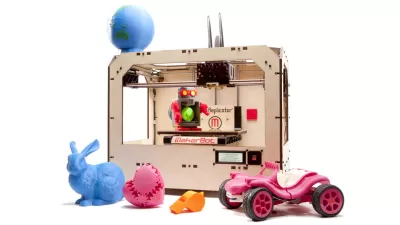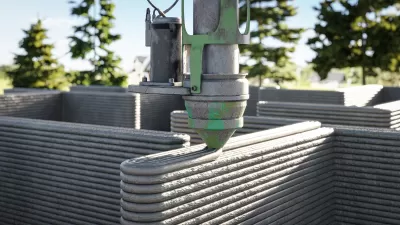Shrinking ports, less noxious trucks on our roads, and more self-sufficient towns. Neal Peirce describes the changes that 3D printing may bring to our lives. Will it be comparable to "the steam engine, the light bulb, atomic energy, the microchip?"

Peirce argues that a future replete with three dimensional printing, where goods can be designed and manufactured individually, could echo "village life in the pre-industrial era, when blacksmiths or seamstresses or carpenters created much of what was needed locally and towns were far more self-sufficient."
The promise of this technology, he says, "could change the future of the world’s cities, perhaps dramatically."
"This could spell big cutbacks in massive container ships and their ports, together with fuel-guzzling truck rigs crisscrossing continents. The United States’ heavy reliance on overseas manufacturing, especially from China, could be cut back dramatically. The carbon footprint of today’s manufacturing and transport could be reduced substantially. 3D involves dramatically reduced waste and use of toxic materials in manufacturing and can ease the demand for such nonrenewable resources as rare earth minerals."
"[T]here’s rarely been a disruptive technology with such positive implications for the welfare and progress of the cities and surrounding regions destined to be mankind’s home through this century and beyond."
FULL STORY: More Self-Sufficient Cities in a 3D Printing World

Maui's Vacation Rental Debate Turns Ugly
Verbal attacks, misinformation campaigns and fistfights plague a high-stakes debate to convert thousands of vacation rentals into long-term housing.

Planetizen Federal Action Tracker
A weekly monitor of how Trump’s orders and actions are impacting planners and planning in America.

Chicago’s Ghost Rails
Just beneath the surface of the modern city lie the remnants of its expansive early 20th-century streetcar system.

Bend, Oregon Zoning Reforms Prioritize Small-Scale Housing
The city altered its zoning code to allow multi-family housing and eliminated parking mandates citywide.

Amtrak Cutting Jobs, Funding to High-Speed Rail
The agency plans to cut 10 percent of its workforce and has confirmed it will not fund new high-speed rail projects.

LA Denies Basic Services to Unhoused Residents
The city has repeatedly failed to respond to requests for trash pickup at encampment sites, and eliminated a program that provided mobile showers and toilets.
Urban Design for Planners 1: Software Tools
This six-course series explores essential urban design concepts using open source software and equips planners with the tools they need to participate fully in the urban design process.
Planning for Universal Design
Learn the tools for implementing Universal Design in planning regulations.
planning NEXT
Appalachian Highlands Housing Partners
Mpact (founded as Rail~Volution)
City of Camden Redevelopment Agency
City of Astoria
City of Portland
City of Laramie




























